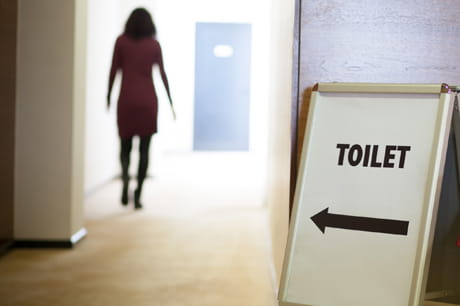Hold it! ‘Leaky bladder’ affects women of all ages
Don’t let incontinence rule your life
Does a laugh make you leak? Does a cough cause the call of the wild? Or does a sneeze make you pee?
This is urinary incontinence, and it’s much more common in women than you may think. In the past year, between 25 and 45 percent of women have had urinary incontinence symptoms. It’s not just older women who are at risk, either — urinary incontinence is common after childbirth and in Caucasian women as well as those with a family history of incontinence. Urinary incontinence symptoms can be either temporary or persistent.
“Urinary incontinence itself is not a disease,” said Dr. Marisa Clifton, MD, a Geisinger urologist. “Rather, it’s a symptom of other factors such as pregnancy, childbirth, problems in the urinary tract, old age and diet. You don’t have to live with the symptoms, though—there are many ways to lessen or even stop it completely.”
Urinary incontinence is classified into five main types: temporary, stress, urgency, overflow and mixed.
Temporary incontinence
“Temporary incontinence is caused by food and drink that act as diuretics and create a high volume of urine output,” said Dr. Clifton. “The bladder struggles to keep up, and you may unintentionally pass some urine. This condition is not permanent and should stop once the offending foods have passed.”
Carbonated beverages, alcohol, large doses of vitamin C, caffeine, artificial sweeteners and spicy, sugary or acidic foods can all cause temporary incontinence.
Stress incontinence
Stress incontinence comes from a weakening of muscles by physical stressors.
“Stress incontinence is often caused by pregnancy, giving birth, muscle strain, or even after a hysterectomy,” said Dr. Clifton. “All of these conditions can cause stress on the bladder and the other muscles that support it. After these muscles are weakened, movements like coughing, exercising and laughing can cause urine leakage.”
Stress incontinence can be caused by sports injuries in young women. In fact, 20 percent of female college athletes report leaking urine while playing.
Urgency incontinence
Urgency incontinence, also known as overactive bladder, comes from a problem with bladder muscle contractions. If bladder contractions aren’t in sync, or if they spasm, urine can slip out. Urgency incontinence means you may just get just a few seconds’ notice or none at all before you start urinating.
Urgency incontinence can be caused by conditions like multiple sclerosis, Parkinson’s disease and urinary tract infections. If you experience urgency incontinence, your doctor may prescribe medication that can help stop bladder spasms.
Overflow incontinence
Overflow incontinence is often known as “dribbling” and comes from an incomplete emptying of the bladder.
“Overflow incontinence is caused by obstructions or narrowing of the urinary tract. While it’s rare women, overflow incontinence can be caused by pregnancy, birth, as well as voiding dysfunction,” said Dr. Clifton. “You should talk to your doctor to identify the cause of overflow incontinence.”
Mixed incontinence
As the name suggests, mixed incontinence is a mix of stress and urgency and overflow incontinence. Any combination of these types can be classified as mixed incontinence. Typically, most people with mixed incontinence have stress and urge incontinence.
Ways to prevent incontinence
If you are experiencing urinary incontinence symptoms, there are steps you can take to reduce your risk or symptoms, including:
- Quitting smoking
- Maintaining a healthy weight
- Changing your diet
- Bladder training
- Pelvic floor exercises (such as Kegels)
- Medical devices
- Surgery
- Electronic nerve stimulation
- Medication
If your incontinence symptoms are persistent and are affecting your life, self-confidence and health, talk to your doctor or urologist about treatment options.
Dr. Marisa Clifton will see patients at Geisinger Medical Center in Danville and at Geisinger Northeast Urology, 6 Wildflower Drive, Wilkes-Barre. To schedule an appointment with Dr. Clifton, please call 800-275-6401.

